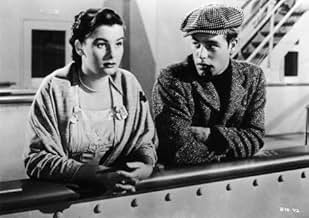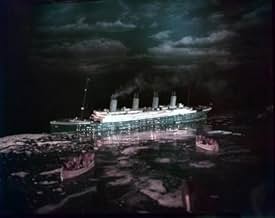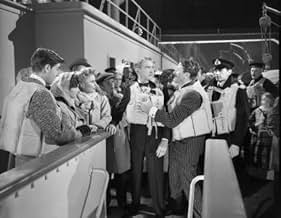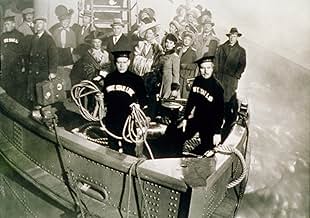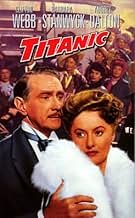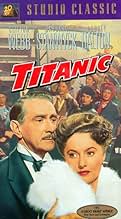Aggiungi una trama nella tua linguaAn unhappily married couple struggle to deal with their problems while on board the luxurious, ill-fated RMS Titanic.An unhappily married couple struggle to deal with their problems while on board the luxurious, ill-fated RMS Titanic.An unhappily married couple struggle to deal with their problems while on board the luxurious, ill-fated RMS Titanic.
- Regia
- Sceneggiatura
- Star
- Vincitore di 1 Oscar
- 1 vittoria e 3 candidature totali
- Seaman
- (non citato nei titoli originali)
- College Girl
- (non citato nei titoli originali)
- Jean Pablo Uzcadum
- (non citato nei titoli originali)
- Passenger
- (non citato nei titoli originali)
- First Officer Murdock
- (non citato nei titoli originali)
- Passenger
- (non citato nei titoli originali)
- Dock Official
- (non citato nei titoli originali)
Recensioni in evidenza
Many decades before James Cameron delivered Titanic as a disaster movie with a dramatic relationship at its core, someone else had already done it with this 1953 disaster melodrama. The main difference in the narrative is perhaps a note on the difference with our time because the story is not about romantically intertwined young people but rather an older married couple and their romance. Aside from this difference the approach is similar because the majority of the film is a melodrama driven by the characters, which then is fitted into the bigger drama of the ship sinking, taking many with it. Unlike the effects-heavy modern version, this film puts the focus on the family drama happening.
This works well in making for an engaging film as we see the very English Richard clashing (in an English way) with the more modern Julia in their relationship. Of course it all comes good in the end (well, in a way) but up till then this centre-piece held my attention well. The emotion during the actual sinking of the ship is well received as well, it is restrained and very much the stiff-upper-lip type of thing of the period. Compared to the manipulative use of music and sweeping expressions of emotions in the remake, I must admit I found the changes in the characters played out with restrained emotions of the disaster. The cast work well with this. Webb is strong in his character, retaining what makes the man while also softening towards the end. Stanwyck does likewise, convincing in her early character but yet able to find the love inside her character from the past. The rest of the cast are solid enough but do not really have the same material as the two leads; Dalton, Aherne, Wagner, Basehart and others are all good enough for what is asked of them and, as normal, Ritter is entertaining in her usual character.
Overall then, an engaging melodrama that maintains a very British sense of emotion but yet is still quite moving. Those who have not yet seen the remake for what it is should perhaps take a pass at this and see if they prefer this version for being shorter and more restrained.
To update these comments almost seven years after they were originally written, the DVD of this film is definitely one for any Titanic buff to have in their collection. It features TWO separate commentary tracks, one by critic Richard Schickel and stars Robert Wagner and Audrey Dalton, the other by Titanic historians. There is also the original theatrical trailer and newsreel footage of the film's premiere and Oscar wins. Most impressive of all, though, is a fascinating feature-length documentary, narrated by Victor Garber (ship-builder Thomas Andrews in the Cameron/DiCaprio film), about the sinking of the Titanic and how's it's been presented in films and on TV from the silent era to the present. All this on one DVD.
Meanwhile drunkard George Healey (Richard Basehart) staggers around on deck, nouveau riche Maude Young (Thelma Ritter) tries to relax, and ship's captain Smith (Brian Aherne) is oblivious to the impending danger. Robert Wagner stars as the wholesome college boy whose teeth practically sparkle who might be able to bring Annette down to earth.
The setting and situation are familiar to most by now, but I still enjoyed this disaster effort that resembles the future disaster "epics" of the 1970's. It follows the usual formula of establishing the characters and their petty troubles before casting them into harm's way, many of them to their doom. I thought Stanwyck and Webb were an odd couple on paper, but it works out fine in the movie, and Webb is very good, especially during the last 20 minutes or so. I was also impressed with Edmund Purdom as a ship's officer with a suspicion of the dangers ahead. The movie won the Oscar for Best Original Screenplay (Charles Brackett, Walter Reisch & Richard L. Breen), and was also nominated for Best B&W Art Direction.
Nonetheless, Ray Kellogg's special effects are outstanding, especially the liner as it lists headfirst into the water that became a spectacular logo for the movie's ad campaign. Note, however, the general absence of noisy panic surrounding the evacuation, the opposite of what you would expect given the life and death circumstance. Generally, both passengers and crew react efficiently as if executing a fire drill. I suspect anything more realistic would have risked unsettling 1950's audiences and dampening box-office appeal, but whatever, the general absence is noticeable. Also, I'm not clear on what happened to the women and children in steerage. These are the poor folk presumably responding to America's "give us your huddled masses yearning to be free". Maybe I missed something, but the class segregation aboard the liner is made unmistakably clear and we do know the ladies and children of wealth made the cut. But what about those "huddled masses" since the movie is based on fact? Still and all, not to worry since they're all going to heaven anyway as the final choral overlay assures us.
Speaking of class struggle, too bad the screenplay doesn't exploit the lively potential of a Clifton Webb-Thelma Ritter face-off. They're two extreme ends of the refinement spectrum — the earthy commoner and the waspish aristocrat. Yet no one was better at delivering sarcastic barbs than these two. Squaring them off against one another would have produced great verbal fireworks and social contrast. All in all, the movie is entertaining with some good moments, but fails to hit the dramatic high points inherent in the real life tragedy. Ultimately, the screenplay reflects the extreme cautiousness of its time period.
Lo sapevi?
- QuizDuring the boarding of the lifeboats, Norman Sturges (Harper Carter) changes seats with a woman who arrives at the last moment when the boat was completely full. This was inspired by the action of a Mexican passenger in first class named Manuel Uruchurtu, who did the same thing to a woman from second class who was refused a seat on the lifeboat. After he gave up his seat to her, he asked her to travel to Mexico, if she survived, and tell his wife what happened. His body was never found.
- BlooperTrying to buy a ticket at the last minute, Richard Sturges (Clifton Webb) is told that the voyage has been sold out since March. In fact, it wasn't even close to sold out.
- Citazioni
Richard Sturges: [after Richard and Julia have been quarreling over who will have custody of their son] My dear Julia, I've been around enough bridge tables to recognize someone who's holding a high trump - play it now if you will.
Julia Sturges: We'll discuss it later.
Richard Sturges: Now!
Julia Sturges: All right, Richard. One question first?
Richard Sturges: If it's about Norman, you know the answer. No court in the world, no power in the heavens can force me to give up my son.
Julia Sturges: He is not your son.
- ConnessioniEdited into Voglio essere amata in un letto d'ottone (1964)
- Colonne sonoreThe British Grenadiers
(uncredited)
Traditional Music
Arranged by Herbert W. Spencer
Played by the band on the Titanic
I più visti
Dettagli
- Data di uscita
- Paese di origine
- Lingue
- Celebre anche come
- Y el mar los devoró
- Luoghi delle riprese
- Azienda produttrice
- Vedi altri crediti dell’azienda su IMDbPro
Botteghino
- Budget
- 1.805.000 USD (previsto)
- Tempo di esecuzione
- 1h 38min(98 min)
- Colore
- Proporzioni
- 1.37 : 1


